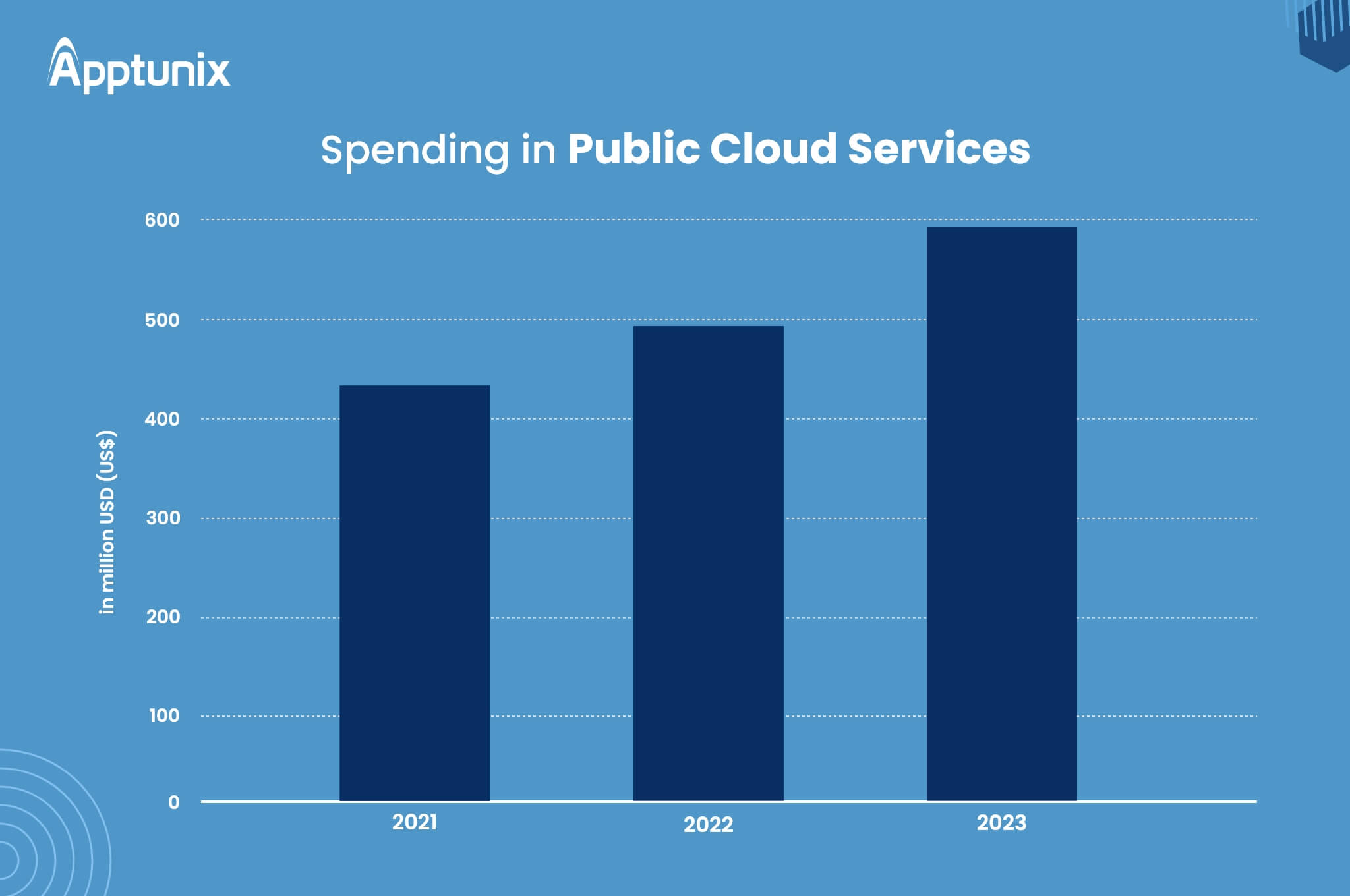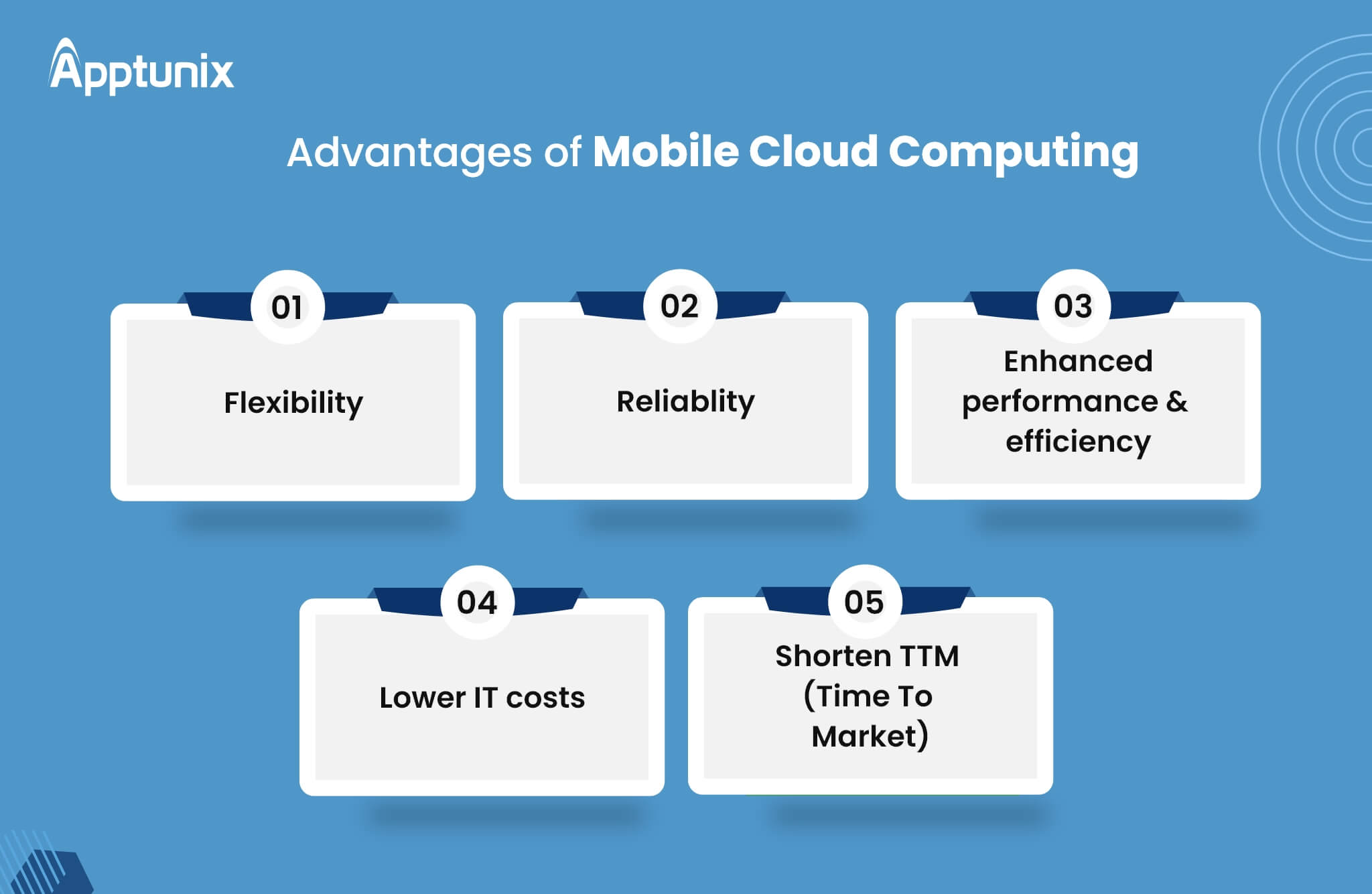Don't miss the chance to work with top 1% of developers.
Sign Up Now and Get FREE CTO-level Consultation.
Confused about your business model?
Request a FREE Business Plan.
Why Mobile Cloud Computing is the Future of Mobile App Development?
Table of contents

Mobile cloud computing is the amalgamation of two top-trending technologies, cloud computing and mobile computing. With just an active internet connection, a user can access data from anywhere in the world and from any mobile device.
Over time, there have been several advancements in mobile app development, and mobile cloud computing is one of them. The cloud computing ecosystem is continuously expanding with businesses and individuals leveraging it for different purposes.

If you’re looking to hop onto the mobile cloud computing bandwagon, then you’ve arrived at the right place to know more about it. In this blog, we will detail mobile cloud computing, its advantages, reasons for adoption, and more.
What is Cloud Computing?
In simple terms, cloud computing is the computing power and resources that are available online. The simple idea is to rely on the internet for power and processing capabilities rather than the native hardware.
There are several benefits of doing so, among which are high availability, reduced cost, and optimal use of resources. Cloud-based mobile app development is among the leading trends in mobile app development that businesses are embracing around the world.
What is Mobile Cloud Computing?
Cloud computing is the technique to leverage cloud computing to enhance the delivery and performance of mobile apps. Mobile cloud computing helps to develop, maintain, and operate mobile apps over the cloud.
Unlike traditional apps that are strictly developed for particular operating systems and hardware configurations, mobile-cloud-computing-powered apps are platform-agnostic. This means that the same cloud app can work across multiple mobile device configurations and operating systems.
Types of Mobile Cloud Computing Services
There are different cloud computing service models to fulfil different sets of requirements. Mobile cloud computing can be classified into one of three categories:

1.IaaS (Infrastructure as a Service)
This form of cloud computing is associated with delivering data storage space, computers and networking features. IaaS provides the highest level of flexibility and control over your IT resources.
2.PaaS (Platform as a Service)
It eliminates the need for organisations to manage the underlying infrastructure and focus more on the deployment and management of applications.
PaaS takes care of capacity planning, software maintenance, patch Management, and resource procurement.

3.SaaS (Software as a Service)
In this type of cloud service model, the services are available in the form of a software that is accessible by the user but it is stored and maintained on the provider’s servers.
With SaaS, companies need not worry about its maintenance and management, the software running on the operating system and servers are managed by the service provider.
Types of Mobile Clouds
A cloud is defined as a network that allows users to access data, applications, and services from different devices. A mobile cloud can be one of the following four types:

1. Public Clouds
A public cloud is a cloud that is accessible to everyone. It is not dedicated to a particular group or user. AWS Cloud, Google Cloud, IBM Cloud, and Microsoft Azure Cloud are the biggest providers of public cloud storage.
In a public cloud, the environment is divided and distributed to multiple tenants (by multitenancy). While a majority of public clouds are free to use, using extended or unlimited resources necessitates purchasing a subscription.
2. Private Clouds
A private cloud environment is allocated to a single group or end-user. A cloud network becomes a private cloud when the underlying IT infrastructure is provided to a single customer with complete private access.
The trend of developing private clouds on rented, vendor-owned data centres that are located off-premises has led to the advent of many subtypes of private clouds, including the following two most popular types:
- Managed Private Cloud – The customer creates the private cloud and a third-party vendor deploys, configures, and manages it.
- Dedicated Cloud – It is a cloud within another cloud. Other than a private cloud, a dedicated cloud can also be on a public cloud.
A private cloud is also called an internal cloud and a corporate cloud.
3. Hybrid Clouds
As the name suggests, it is a cloud that is made from multiple environments connected via APIs, LANs, WANs, or VPNs. As a hybrid cloud is a mishmash of many different things, a general set of characteristics is difficult to pin down.
4. Multiclouds
A cloud that is made up of more than one cloud service from more than one cloud vendor is termed a multicloud. Every hybrid cloud is a multicloud, but not every multicloud can be a hybrid cloud.
Usually, multiclouds are used to provide storage space for disaster recovery and better control over sensitive data. It might also result from shadow IT.
Perks of Mobile Cloud Computing
Mobile cloud computing is continuing to change the face of mobile app development. Following are some of the most important features that organisations and mobile app developers are leveraging by implementing mobile cloud computing:

1.No More Limited Storage
Storage has always been a major concern on mobile devices. Mobile cloud computing solves this problem by providing mobile devices with seemingly unlimited online storage space. Usually, cloud-based apps have a larger storage capacity than traditional apps.
2.Related to Leading Technologies
Cloudlet, CSS3, HTML5, and Hypervisor VMs power mobile cloud computing. A sound understanding of these technologies helps to efficiently leverage mobile cloud computing.
3.Less Expenditure
As the organisation doesn’t need to purchase any resources to manage and maintain, there is less expenditure than the traditional method of purchasing and installing resources on-premises.
4.Flexibility
Another major benefit of implementing mobile cloud computing is the flexibility that it brings. Businesses can scale up or scale down services as per their requirements. Moreover, customisation is easy as compared to non-cloud-based models.
5.High Availability
One of the most important benefits of leveraging the cloud is high availability. This is made possible by virtualisation and the availability of a range of servers.
Reasons to Choose Mobile Cloud Computing
Cloud computing is the future of mobile app development. There are many reasons why integrating cloud computing in the development of mobile apps can help businesses rake in several benefits, including:

1. Cost-Effective
From the perspective of a business, a technology is as good as it costs. Mobile cloud computing helps to significantly lower the costs to maintain an app and thus, saves a lot of money in the longer run after making a single expenditure at the beginning of mobile app development.
2. Device Battery Optimisation
Battery consumption has always been a major concern for mobile devices. The more data a mobile device stores and processes, the more battery power is required.
Mobile cloud computing helps optimise the battery life of mobile devices by taking data processing and storage online.
3. Rapid Data Synchronisation
Mobile cloud computing facilitates faster data synchronisation. This makes accessing and storing data easier. Moreover, users can easily manage data from various devices, such as desktops and smartphones. Without consuming any storage on your device, the cloud serves as a backup for your data.
4. Superior No-Load Processing
Processing is an important aspect of computing. In non-cloud-based systems, it is taken care of by a processor. In mobile cloud computing, the chore of processing is taken care of by the cloud itself. Thus, there is no requirement for using the device’s processor.
Since there is no load on the mobile device to process the data, the speed and performance of the mobile device improves as a result.
How Apptunix Helps You to Build an App With Mobile Cloud Computing?
Apptunix is an experienced mobile app development company developing mobile apps for Android and iOS for over a decade. We have an experienced team of mobile app developers adept in developing hybrid, cross-platform, and native mobile applications.
We offer a wide variety of services to meet different mobile app development requirements. Our professionals are well aware of the latest trends and technologies in developing mobile apps and help you with one or more aspects of your app development endeavours.
Conclusion
Mobile usage has outlasted desktop usage, and thus, mobile apps have become more important than ever. Mobile cloud computing is changing the way mobile app development works. To champion the mobile app market, businesses need to embrace this new trend.
With mobile cloud computing by their side, developers can create apps without worrying about compatibility issues and processing requirements.

Frequently Asked Questions(FAQs)
Q 1.What is meant by mobile cloud computing?
Also known as mobile cloud computing, MCC is the technique to leverage cloud computing technology to deliver mobile applications that are rich in user experience, readily scalable and available, and highly complex, such as implementing authentication and offering curated content to users.
Q 2.What is the objective of mobile cloud computing?
Mobile cloud computing aims to deliver a rich user experience and high execution of rich mobile applications across a diverse range of mobile devices.
Q 3.When did mobile cloud computing start?
The term mobile cloud computing started doing the rounds right after cloud computing was introduced to the table back in 2007.
Q 4.What are the challenges of mobile cloud computing?
Issues related to hardware, operating system and software, service availability, and low network bandwidth are the main challenges in developing mobile cloud computing.
Q 5.Name some key features of mobile cloud computing?
Automation, availability, cost-effectiveness, rapid elasticity, scalability, resource pooling, provider maintenance, and provider monitoring and security are some key features of mobile cloud computing.
Rate this article!
(1 ratings, average: 4.00 out of 5)
Join 60,000+ Subscribers
Get the weekly updates on the newest brand stories, business models and technology right in your inbox.
Akhil has been writing content since 2014. Although he has written content across various niches, his forte is technology writing. Throughout his tenure he has worked in various capacities. He is presently working as the Marketing Manager for Apptunix.

Telemedicine 2.0 - A Comprehensive Guide On What Healthcare Providers Need To Know?
Discover how the latest advancements like Artificial Intelligence in telemedicine are reshaping patient care. This comprehensive resource offers insights into the key trends and innovations driving this shift, providing valuable knowledge for healthcare professionals looking to stay ahead.
Download Now!Subscribe to Unlock
Exclusive Business
Insights!
And we will send you a FREE eBook on Mastering Business Intelligence.


















